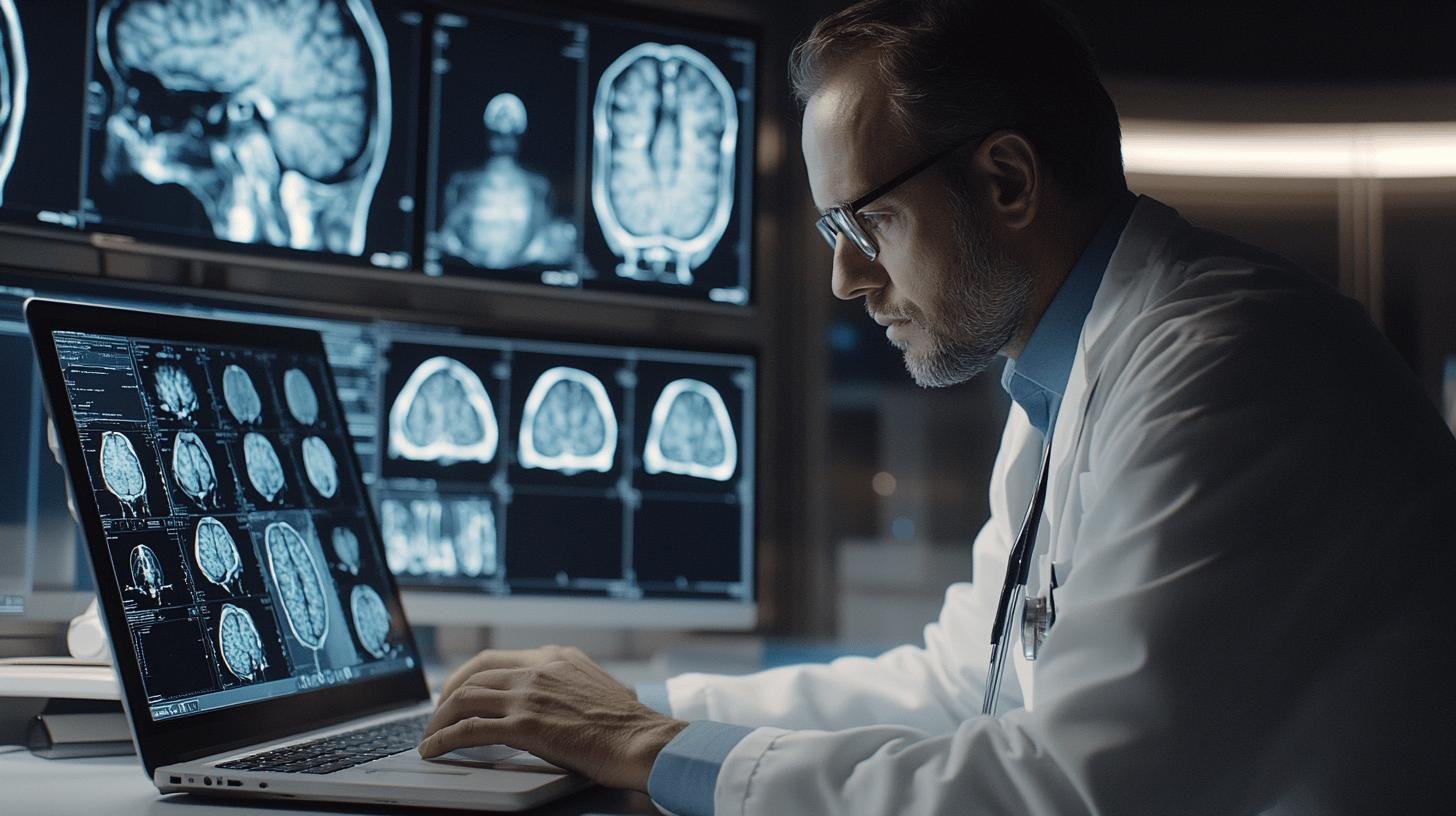Can you imagine a world where doctors can diagnose diseases with extreme precision? AI integration in healthcare is making this vision a reality by using machine learning and other advanced tech to enhance how we take care of patients. From spotting diseases early to creating personalized treatment plans, AI is changing the game. In this article, we’ll dive into how AI is transforming healthcare, making it smarter and faster. Let’s unravel the secret behind AI in healthcare and see how it’s reshaping patient care as we know it!
Understanding AI Integration in Healthcare
AI integration in healthcare comes with cutting-edge technologies like machine learning, natural language processing (NLP), and deep learning. These aren’t just buzzwords but tools empowering medical professionals. Picture AI as a tireless assistant, helping to sift through vast patient data, identify patterns, and enable faster and more accurate decisions.
Where is this tech making waves in healthcare? Consider these groundbreaking areas:
- Medical Diagnosis: AI enables quicker, more accurate disease identification.
- Drug Discovery: It accelerates new medicine development, saving costs and time.
- Patient Experience: AI-powered apps and chatbots personalize healthcare.
- Data Management: AI simplifies data organization.
- Robotic Surgery: AI supports precision and care in surgeries.
Imagine a world where AI has transformed patient care. It’s not just about curing diseases but predicting, preventing, and personalizing care like never before. AI’s potential is to enhance efficiency and effectiveness, improving patients’ healthcare experiences. Ultimately, AI elevates care quality to new heights.
AI-Driven Diagnostics and Treatment

AI is redefining disease diagnosis, offering speed and accuracy. How does this work? By analyzing large data sets and recognizing patterns, AI minimizes human error and ensures precise diagnoses, even when medical histories are complex.
1. AI in Medical Imaging
AI is transformative in medical imaging. It improves scan analyses, like MRIs and X-rays, for early disease detection. How? By using algorithms to pinpoint abnormalities often missed by humans. This innovation allows for early cancer detection, improving recovery chances.
2. AI in Treatment Planning
AI personalizes treatment plans by evaluating genomic data and past cases. It suggests optimal interventions for each patient, enhancing results and reducing trial-and-error.
AI in medical imaging aids in early disease detection, enhancing diagnostic accuracy. For treatment planning, AI supports the creation of personalized treatment plans tailored to each patient’s needs.
AI isn’t just about technology; it’s about smarter, more personalized healthcare. Improved diagnostics and tailored treatment planning are transforming patient care.
Operational Efficiency Through AI
Efficiency is pivotal in healthcare, and AI is key to achieving it. Why does efficiency matter? It directly affects patient care and satisfaction. Streamlining processes with AI lets hospitals prioritize patient needs over paperwork, speeding up data management to ensure accurate information at all times.
What tasks does AI alleviate? Consider these:
- Data Entry: Automation takes over mundane tasks like data input.
- Appointment Scheduling: AI manages calendars to prevent double bookings.
- Inventory Management: It tracks supplies to avoid shortages.
- Billing and Invoicing: AI maintains accurate billing and timely invoicing.
- Patient Registration: Registration becomes quick and requires minimal manual effort.
AI enhances hospital management, working as an indefatigable manager. It streamlines operations, minimizes human errors, and automates repetitive tasks. So, AI not only accelerates processes but also fortifies healthcare reliability and intelligence.
Ethical Challenges of AI in Healthcare

AI in healthcare presents amazing benefits, but it also poses ethical challenges. Ensuring patient consent and privacy is crucial when handling extensive data. Fairness matters too—AI must treat all patients equally without hidden biases. There’s also concern over AI’s impact on the human touch in medicine. Accountability and transparency are essential to maintaining trust when errors occur.
Challenges facing AI in healthcare include:
- Regulatory Hurdles: Navigating AI tool approvals can be complex.
- Data Security: Protecting sensitive information is an ongoing challenge.
- Integration Issues: Ensuring seamless AI integration with current systems is vital.
- Technological Bias: Ensuring algorithms don’t favor certain groups is critical.
Addressing these issues involves evolving regulations to balance safety with innovation. Transparency fosters patient trust by clearly communicating data use. Mitigating bias requires diverse data sets and monitoring techniques. By tackling these challenges, AI’s benefits can be maximally realized, keeping healthcare fair and human-focused.
Future Trends in AI Healthcare
AI is set to transform diagnostics and personalized medicine. Fast data analysis will allow diseases to be detected earlier than ever. Imagine AI spotting conditions before symptoms appear, illustrating precision medicine at its best. Treatments tailored to individual genetics can significantly improve outcomes. While changes typically take two decades, data analytics could speed up this process.
AI-Driven Innovations
Let’s explore future technologies. AI is venturing into genomics and wearable tech. Consider the potential of a smartwatch predicting health issues based on daily habits. AI-powered telemedicine can provide personal virtual consultations. These aren’t just intriguing novelties but are poised to redefine healthcare perception.
AI-assisted robotic surgery marks another leap, enhancing precision and efficiency. This could mean fewer complications and faster patient recoveries.
The future promises smarter healthcare, thanks to AI. Technology will embed into routine practices, fostering proactive and efficient care. AI’s resource management and need predictions will reduce patient wait times, allowing healthcare professionals to focus on caregiving. While we may not see flying cars, the future of healthcare is undoubtedly promising!
Conclusion
AI integration in healthcare is here, changing how we see medicine. From supercharging diagnostics to personalizing your treatment, AI’s impact is hard to ignore. It’s boosting efficiency and helping healthcare pros spend more time with patients, making everyday tasks smoother.
Sure, there are ethical twists and hurdles to think about, but with smart regulation, obstacles can be addressed. As we peek into the future, AI in healthcare shows promise with continued innovation. Embracing AI can lead to better care and improved outcomes for all.
FAQ
How is AI integrated into healthcare?
AI integration in healthcare uses technologies like machine learning, natural language processing, and deep learning. These tools enhance healthcare professionals’ capabilities and improve patient experiences. They aid in medical diagnosis, drug discovery, patient experience, data management, and robotic surgery.
What is an example of AI being used in healthcare?
An example is AI-driven diagnostics, where algorithms help in identifying diseases faster than traditional methods. This results in earlier detection and treatment, ultimately boosting patient outcomes.
What is the future of AI in healthcare?
The future of AI in healthcare promises advancements in diagnostics and personalized medicine. AI will likely enhance operational efficiency, improve patient care, and reduce healthcare costs.
How does AI reduce human error in healthcare?
AI reduces human error by analyzing vast amounts of data more accurately and efficiently than humans. It enhances diagnostic accuracy and aids in creating personalized treatment plans based on genomic data.




